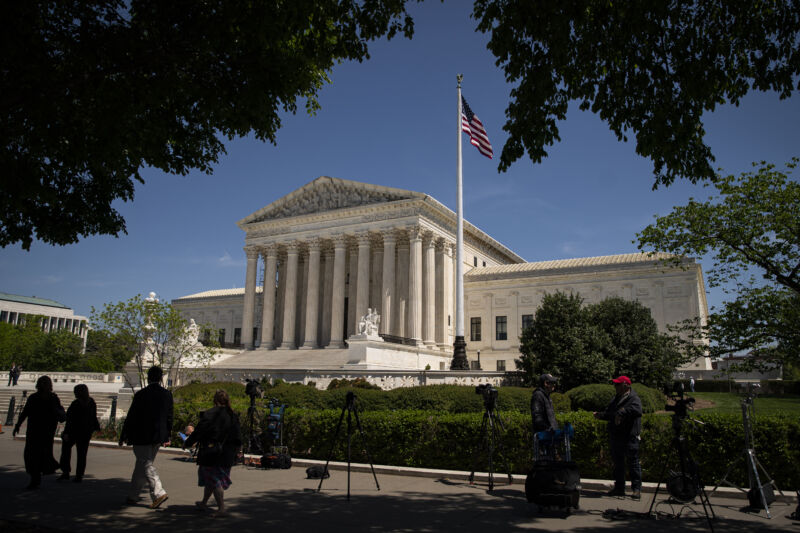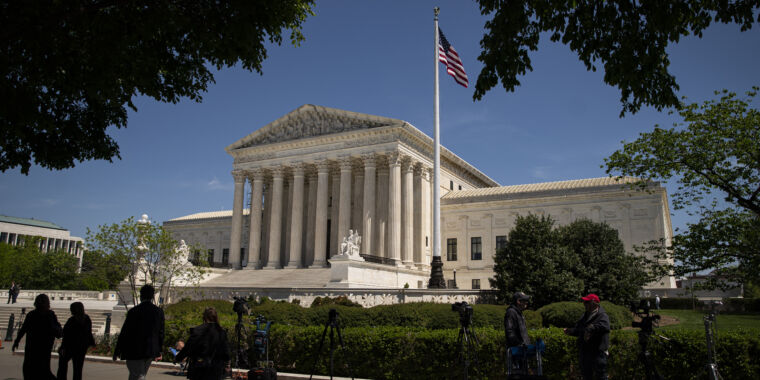
The Supreme Court on Friday issued an order that maintains status quo access to the abortion and miscarriage drug mifepristone as the legal battle over the drug’s approval and regulation by the Food and Drug Administration continues. The court did not explain its reasoning, but noted that Justices Clarence Thomas and Samuel Alito disagreed.
The ruling supersedes an order from the Court of Appeals for the 5th Circuit in New Orleans that would have restricted access to the drug as the federal government appeals a district court ruling. That ruling, issued by Conservative District Judge Matthew Kacsmaryk on April 7, would have completely revoked access to the drug, arguing that the FDA’s 2000 approval of mifepristone was illegal, as were the agency’s subsequent actions.
However, a three-judge panel before the appeals court determined that the plaintiff in the case — a group of anti-abortion organizations and individuals, led by the Alliance for Hippocratic Medicine — had passed the statute of limitations during which they could have legally challenged the approval of the FDA from 2000. But the judges ruled in a 2-1 decision to allow the remainder of Kacsmaryk’s ruling, reversing the FDA’s actions in 2016 and 2021, relaxing restrictions and access to the drug.
Had restrictions been reinstated, this would have meant that mifepristone would only be available for seven weeks into a pregnancy, not 10; that women should go to three in-person doctor visits, instead of just one, possibly through telemedicine; the drug should not be delivered by post; and that doctors should again report all non-fatal side effects.
In an appeal to the Supreme Court, Danco Laboratories, the maker of mifepristone (brand name Mifeprex), said the appeals court ruling created “debilitating uncertainty” and a “regulatory mess.” It wrote in its call:
To distribute Mifeprex under something other than the 2023 REMS [the FDA’s latest regulations]must Danco: review product labels, packaging, and promotional materials; recertify providers; and amend its supplier and distributor contracts and policies (among other things). All of these are currently based on the 2023 REMS. So is Danco’s current distribution model. However, before Danco can make any changes, it must have a new REMS, which requires Danco to submit an additional NDA (sNDA) and FDA approval. That process usually takes months. It’s unclear if Danco can continue to distribute Mifeprex while that sNDA is pending with the FDA, even though it would technically be misbranded, or if doing so would expose Danco to civil and criminal penalties. And then Danco may have to jump through all these hoops again if the order is ultimately changed or withdrawn on appeal.
Further complicating the case is a ruling by a Washington district judge barring the FDA from changing access to mifepristone in 17 states and the District of Columbia. And on Wednesday, GenBioPro, the maker of the generic mifepristone that was approved by the FDA in 2019, sued the FDA to prevent the agency from complying with an order to remove the generic from the market.
Overall, the case marks the first time an incompetent district judge has ruled to strike down an FDA approval, based in part on the argument that the FDA erred in its expert scientific analysis. If the anti-abortion groups ultimately prevail in the appeal, it will set a dangerous precedent, opening the floodgates for lawsuits to question the FDA’s authority in regulatory actions and approvals and throwing drug development into chaos, legal experts say, former federal officials and numerous members of the pharmaceutical and biotech industries.
The appeals court has expedited the case and plans to hold first oral arguments on May 17.

